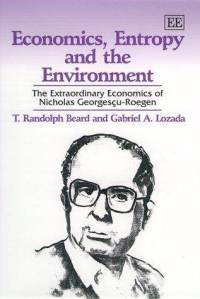Georgescu-Roegen on why ‘most of the time all of us talk some nonsense’ Positivism does not seem to realize at all that the concept of verifiability — or that the position that ‘the meaning of a proposition is the method of its verification’ — is covered by a dialectical penumbra in spite of the apparent rigor of the sentences used in the argument … I hope the reader will not take offense at the unavoidable conclusion that most of the time all of us talk some nonsense, that is, express our thoughts in dialectical terms with no clear-cut meaning … The position that dialectical concepts should be barred from science because they would infest it with muddled thinking, is, therefore, a flight of fancy — unfortunately, not an innocuous one. For it has bred another kind of muddle that now plagues large sectors of social sciences: arithmomania. To cite a few cases from economics alone. The complex notion of economic developmet has been reduced to a number, the income per capita. The dialectical spectrum of human wants … has long since been covered under the colorless numerical concept of ‘utility’ for which, moreover, nobody has yet been able to provide an actual procedure of measurement. In the postwar period, it has become increasingly clear that economic growth has not only brought greater prosperity.
Topics:
Lars Pålsson Syll considers the following as important: Economics
This could be interesting, too:
Lars Pålsson Syll writes Schuldenbremse bye bye
Lars Pålsson Syll writes What’s wrong with economics — a primer
Lars Pålsson Syll writes Krigskeynesianismens återkomst
Lars Pålsson Syll writes Finding Eigenvalues and Eigenvectors (student stuff)
Georgescu-Roegen on why ‘most of the time all of us talk some nonsense’
Positivism does not seem to realize at all that the concept of verifiability — or that the position that ‘the meaning of a proposition is the method of its verification’ — is covered by a dialectical penumbra in spite of the apparent rigor of the sentences used in the argument …
I hope the reader will not take offense at the unavoidable conclusion that most of the time all of us talk some nonsense, that is, express our thoughts in dialectical terms with no clear-cut meaning …
The position that dialectical concepts should be barred from science because they would infest it with muddled thinking, is, therefore, a flight of fancy — unfortunately, not an innocuous one. For it has bred another kind of muddle that now plagues large sectors of social sciences: arithmomania. To cite a few cases from economics alone. The complex notion of economic developmet has been reduced to a number, the income per capita. The dialectical spectrum of human wants … has long since been covered under the colorless numerical concept of ‘utility’ for which, moreover, nobody has yet been able to provide an actual procedure of measurement.
In the postwar period, it has become increasingly clear that economic growth has not only brought greater prosperity. The other side of growth, in the form of pollution, contamination and wastage of resources, has emerged as perhaps the greatest challenge of our time.
Against the neoclassical theory’s view on the economy as a balanced and harmonious system, where growth and the environment go hand in hand, ecological economists object that it can rather be characterized as an unstable system that at an accelerating pace consumes energy and matter, and thereby pose a threat against the very basis for its survival.
 The Romanian-American economist Nicholas Georgescu-Roegen (1906-1994) argued in his epochal The Entropy Law and the Economic Process (1971) that the economy was actually a giant thermodynamic system in which entropy increases inexorably and our material basis disappears. If we choose to continue to produce with the techniques we have developed, then our society and earth will disappear faster than if we introduce small-scale production, resource-saving technologies and limited consumption.
The Romanian-American economist Nicholas Georgescu-Roegen (1906-1994) argued in his epochal The Entropy Law and the Economic Process (1971) that the economy was actually a giant thermodynamic system in which entropy increases inexorably and our material basis disappears. If we choose to continue to produce with the techniques we have developed, then our society and earth will disappear faster than if we introduce small-scale production, resource-saving technologies and limited consumption.
Following Georgescu-Roegen, ecological economists have argued that industrial society inevitably leads to increased environmental pollution, energy crisis and an unsustainable growth.
After a radio debate with one of the members of the prize committee twenty years ago, yours truly asked why Georgescu-Roegen hadn’t got the prize. The answer was – mirabile dictu – that he “never founded a school.” Talk about nonsense! I was surprised, to say the least, and wondered if he possibly had heard of the environmental movement. Well, he had – but it was “the wrong kind of school.” Can it be stated much clearer than this what it’s all about? If you haven’t worked within the neoclassical paradigm – then you are excluded a priori from being eligible for the The Sveriges Riksbank Prize in Economic Sciences in Memory of Alfred Nobel!
